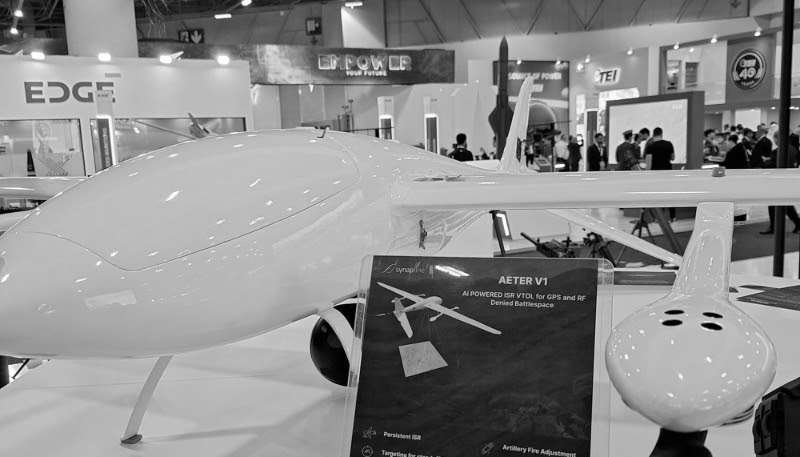Azerbaijani intelligence abounds in Chinese drone technology

Despite signing a peace deal with its Armenian neighbour in August, Azerbaijan is continuing to develop its drone industry. While partnerships with Turkey and Israel enabled the country to win the Nagorno-Karabakh war, Baku is now looking to equip itself on a massive scale in deals with China.
The AETER V1 drone from Azerbaijani company Synapline at the Turkish defence exhibition IDEF in Istanbul, 22 to 27 July 2025.
According to Synapline representatives we met on the sidelines of the Turkish defence exhibition IDEF in Istanbul from 22 to 27 July, the platform of the future drones, which will be used to gather intelligence, was indeed purchased from T-Drones. Rather than embarking on a long and complex development project, the firm has turned to the Chinese drones to save both money and time.
Indeed, the VA32 comes with an unbeatable price tag of $12,890 per unit. Another drone from the Synapline catalogue is in fact the Chinese firm’s MX860 drone, which, for $4,299 per unit, can integrate all types of equipment, including surveillance, transport and munitions. On another note, T-Drones also registered a sales agent in the United Kingdom in April: Telos Trading Ltd, headed by Shanghai businessman Junhao He.
Foreign dependence
Once delivered, the Chinese VA32 is an “empty shell” that should be fitted with tactical intelligence technologies to become the Azerbaijani AETER V1. Synapline offers clients other products from abroad to equip the Chinese VTOLs. The Baku-based firm assures it has the capacity to integrate electro-optical systems of Estonian company Threod System, American Trillium Engineering or Chinese Chengdu Qiansight Technology. Products are then ready for ISR (intelligence, surveillance and recognition) and ISTAR (intelligence, surveillance target acquisition and reconnaissance) missions, in particular in saturated technological environments.
While Baku is seeking autonomy in the merging of its intelligence data, almost all the engineers of the company headed by Bekir Guliyev were trained in Turkey. In particular, they underwent training in the research and development centers of Baykar Makina, which conceived the software interfaces of Akinci and Bayraktar TB2 drones.
The same engineers are currently developing AI bricks to be integrated into the AETER. The drone’s autonomous navigation is provided by the Synap AI onboard computer system, which uses an AI computer vision algorithm to recognise its environment and identify potential targets.
Race for Chinese technology
These innovations are essential for Baku after its two recent victories over Armenia in Nagorno-Karabakh. Yerevan is now well aware of the systems used by the Azerbaijani army, including Israel Aerospace Industries loitering munitions Harop and Harpy as well as the Turkish TB2.
Despite signing a peace agreement in Washington of 8 August, the two countries are watching each other with a wary eye. In anticipation of any potential return of hostilities, Yerevan, like Baku, is shopping in China.





